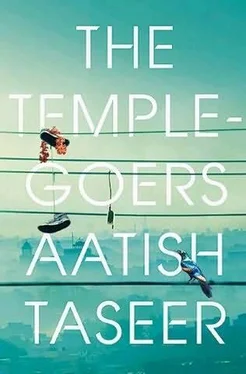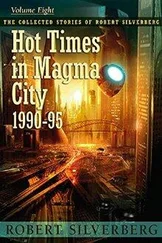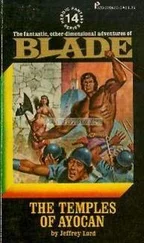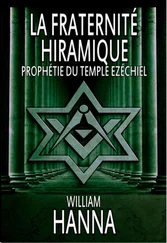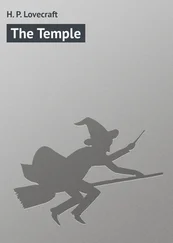‘You know what’s behind that gate?’ Aakash said, putting his hand lightly on my shoulder.
‘No.’
‘The airport. We used to go there at night as children and see the planes and lights. It’s better than take-off point. You’re literally right there in the grass when the planes go by. Mind-blowing.’
I thought of my own arrival there a few months before on the Jet Airways flight. Then I thought of Aakash and his childhood memory of the airport. And even though a mood of inadequacy hung over the day’s outing, with this thought my great tenderness for him flooded back.
Aakash insisted the day needed its ‘super set’. I said, thinking of his bald nephew in the temple, that I was sure it had already had one. Then he wanted to know when and I had no answer for him. He searched my face for a moment and turned back to the task at hand. He was looking for a ‘pardy’ shirt. We stood in his mattress-covered room with its pink walls and fetid air. A green metal cupboard was open; many unsuitable options lay strewn on the mattress below. Presently he found it, a black shirt with silver pinstripes. Its thick shiny material glowed in the white light.
A few minutes later, we were on his bike, driving through the smoky Delhi night. It was my first time riding pillion on a motorbike and I felt exposed, embarrassed to be gripping on so tightly. We drove through areas I didn’t know existed. Broken, keekar-lined roads, open fields and a hyacinth-choked canal, with the red lights of a power station reflected in its dark water, appeared on our way.
‘Where are we?’ I yelled.
‘What?’
‘Where are we?’
‘In Sectorpur,’ Aakash yelled back, ‘just across the Jhaatkebaal border.’
We came some minutes later to an arrangement of tall four-square buildings surrounded by flat agricultural land. Though the buildings were new, marks of decay had already begun to appear on them. Pan spittle festooned their chalky-white walls, metal slats along their side had begun to rust and sacks of cement, plastic buckets and brooms cluttered their corridors. A white wooden bathroom door was open and from the grey marble interior toilet smells filled the lobby. We waited for the lift. Outside, a group of young boys chased a squirrel with an air gun. It ran up a tree and the boys stood below, firing aimlessly into the street-lit canopy.
‘Fucking it,’ Aakash said, when after many minutes the fat red number indicating which floor the lift was on didn’t move. ‘Let’s take the stairs.’
‘Listen, Aakash, are you going to tell me now who this friend of yours is?’
His eyes gleamed. ‘What, man? Don’t trust me, man? I told you, this is my very old friend. The Begum of Sectorpur. Now, come on.’
We ran up seven flights of stairs. The banister shook; there were broken panes on every landing, with sharp points of glass clinging on; below, rejoicing boys carried away the body of a squirrel; the land around was bare and dark, streaked with amber stretches of empty road. Halfway up, we were met by a thin young man with glassy eyes. He wore pedal pushers and a black vest. His small, dense armpits were exposed and emitted a wet, poisonous smell. He was overjoyed to see Aakash, and showing blackened teeth, kept monotonously asking how long it had been. Though Aakash paid him no attention, he jogged up alongside us, laughing and slurring. At every landing he looked back at me, his glassy eyes catching the light, and said, ‘Any friend of Aakash’s is a friend of mine.’
When we reached the eighth floor, Aakash slipped his arm around the man’s wiry frame, and whispering purposefully, took him into the gloom at one end of the corridor. They were still talking when the front door nearest to me swung open. A woman in a pale green kaftan stood behind a black metal gate. She was a warm brown colour, with straight waxy hair and slightly jowly cheeks; her smooth hairless skin and raised eyes made me think she was north-eastern or Nepalese. The outline of her large, full body was visible through the fine cotton she was wearing. She clutched the gate with one hand and under the white tips of her French manicure she had tiger-print nails.
She smiled broadly at me and laughed girlishly when she saw Aakash.
‘Suitors, Begum saab!’ the thin man sneered before vanishing down the stairs.
She snapped abuse at him. When it was returned with a wayward cackle, lost in the darkness, she looked back at us and was gracious once again.
The gate opened and we entered a clean brightly lit flat with tiled floors. The begum shut and bolted an iron front door behind us. Apart from the main lock, there were some five or six other locks crudely welded on. A tile of Ganesh near the door read: ‘May he bless every corner of this house.’
An Alsatian with cataract-clouded eyes bounded up to greet us.
‘Stop it, stop it, Zabar,’ the begum said, pushing aside the dog’s snout and showing us into a drawing room, which contained a glass dining table, white leather chairs and sofas under plastic covers. A partially drunk bottle of Diet Coke and a glass-cleaning spray, half-full of blue liquid, stood on the dining table.
Within moments of our sitting down, the begum had rushed off into the kitchen and reappeared with glasses, ice and a bottle of Seagram’s Indian whisky. Aakash looked at me and winked as she poured the whisky. The begum spoke rapidly, complaining about security, then about how Aakash never came to see her any more.
‘At one point,’ she said, looking over her shoulder at me, ‘it was all, “Begum this”, “Begum that” – “Begum, my friends will protect you”, “Begum, can I give you a lift somewhere on my bike?” but now, since he’s on his way to bigger things, since -’
‘Ah, ah, ah,’ Aakash said firmly.
The begum shut up, then a moment later looked mournfully back at me and said, ‘Begum’s been forgotten.’
When she brought us our whiskies Aakash took his, and quoting an Urdu poet, said, ‘An age has passed, and your memory has not come to me, but that I have forgotten you – it is not that way either.’
The begum melted. ‘Oh-ho-ho,’ she said. ‘Quoting back to me the couplets I taught you? How easily they come off your tongue.’
Aakash laughed and grabbed her through her cotton kaftan as she gave me my whisky, nearly causing her to fall over on to the sofa.
She moaned and recovered herself.
We drank two or three more whiskies. The begum spoke continuously. She made light flirtatious conversation; she complained about what a burden the Alsatian had become – ‘A blind guard dog! That’s all the begum’s left with’; she lashed out at women more debased than herself but protected by the false sanctities of marriage; she complimented Aakash on his physique; she said her son, who was ‘a carbon copy’ of Aakash, was working as a chowkidar in some rich industrialist’s house, couldn’t Aakash help him get a job in fitness? This request caused friction between them. Aakash cautioned her with a cold stare and her tune changed. She became maternal even as she trailed her tiger nail down his cheek: ‘How good and strong my little boy has grown up to be. I still remember when he was sixteen and -’
‘Begum.’
‘OK, OK, I won’t say.’
Aakash affected a macho silence, the whisky and the begum’s chatter seeming to relax him. But for the pinstripe ‘pardy’ shirt, he was like a man who’d just come home from a hard day at the office. To see him twice in the same day, and in such different ways, a hero among the people he grew up with, made me feel again the power of his position. His versatility was like a confirmation of how authentic and robust his world was. His Delhi was a city of temples and gyms, of rich and poor people, of Bentleys and bicycles, of government flats and mansions, of hookers and heiresses, and he asserted his nativity by moving freely between its varied lives. He made it seem like no less his right than taking one of the new green buses, riding the metro, seeing the sound and light show at the Red Fort or renting a pedal boat at India Gate and floating over the reflections of dark trees and pale sky in its sandstone water tanks.
Читать дальше
